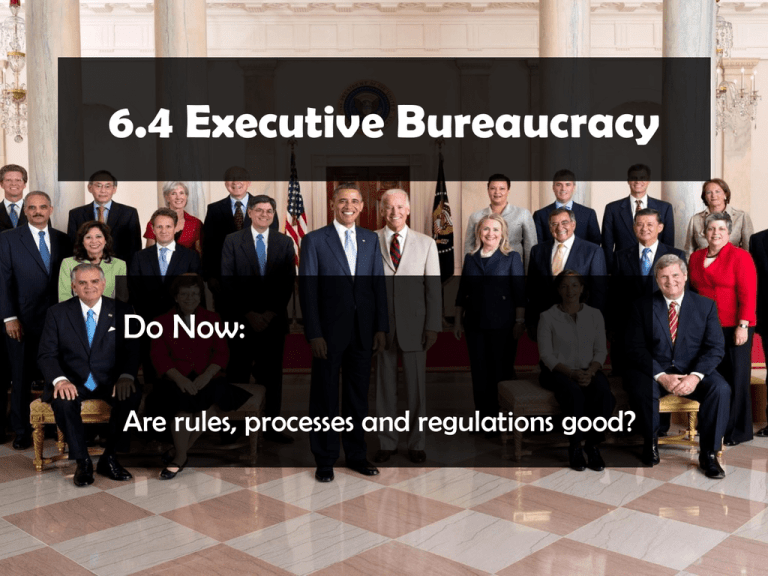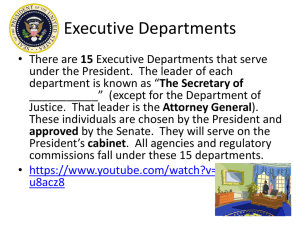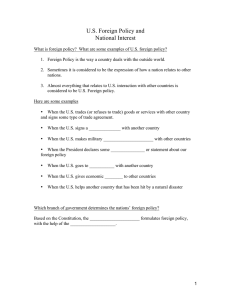Executive Bureaucracy
advertisement

6.4 Executive Bureaucracy Do Now: Are rules, processes and regulations good? 4.4 Executive Bureaucracy The complex administrative structure that executes the everyday business of the government. Executive Office of the President This is the group of people that work directly with the President, advising him on important issues and carrying out his orders. The Cabinet Executive Departments State: “Advance freedom for the benefit of the American people and the international community by helping to build and sustain a more democratic, secure, and prosperous world composed of well-governed states that respond to the needs of their people, reduce widespread poverty, and act responsibly within the international system.” Secretary: John Kerry Executive Departments Treasury: “Maintain a strong economy and create economic and job opportunities by promoting the conditions that enable economic growth and stability at home and abroad, strengthen national security by combating threats and protecting the integrity of the financial system, and manage the U.S. Government’s finances and resources effectively.” Secretary: Jack Lew Executive Departments Defense: “The mission of the Department of Defense is to provide the military forces needed to deter war and to protect the security of our country.” Secretary: Chuck Hagel Executive Departments Justice: “To enforce the law and defend the interests of the United States according to the law; to ensure public safety against threats foreign and domestic; to provide federal leadership in preventing and controlling crime; to seek just punishment for those guilty of unlawful behavior; and to ensure fair and impartial administration of justice for all Americans.” Secretary: Eric H. Holder, Jr. Executive Departments Interior: “The U.S. Department of the Interior protects America’s natural resources and heritage, honors our cultures and tribal communities, and supplies the energy to power our future.” Secretary: Sally Jewell Executive Departments Agriculture: “We provide leadership on food, agriculture, natural resources, rural development, nutrition, and related issues based on sound public policy, the best available science, and efficient management.” Secretary: Thomas J. Vilsack GMO A-Go-Go This cynical (and anti-GMO) film explores what GMO means and how biotech companies keep it in our food system. Executive Departments Commerce: “To promote job creation, economic growth, sustainable development and improved standards of living for all Americans by working in partnership with businesses, universities, communities and our nation’s workers.” Secretary: Rebecca Blank Executive Departments Labor: “To foster, promote, and develop the welfare of the wage earners, job seekers, and retirees of the United States; improve working conditions; advance opportunities for profitable employment; and assure work-related benefits and rights.” Secretary: Seth D. Harris Executive Departments Health and Human Services: “The United States government’s principal agency for protecting the health of all Americans and providing essential human services, especially for those who are least able to help themselves.” Secretary: Kathleen Sebelius Executive Departments Housing and Urban Development: “To create strong, sustainable, inclusive communities and quality affordable homes for all.” Secretary: Shaun L. S. Donovan Executive Departments Transportation: “Serve the United States by ensuring a fast, safe, efficient, accessible and convenient transportation system that meets our vital national interests and enhances the quality of life of the American people, today and into the future.” Secretary: Ray LaHood Executive Departments Energy: “Ensure America’s security and prosperity by addressing its energy, environmental and nuclear challenges through transformative science and technology solutions.” Secretary: Steven Chu Executive Departments Education: “Promote student achievement and preparation for global competitiveness by fostering educational excellence and ensuring equal access.” Secretary: Arne Duncan Executive Departments Veteran’s Affairs: To fulfill President Lincoln's promise “To care for him who shall have borne the battle, and for his widow, and his orphan” by serving and honoring the men and women who are America’s veterans. Secretary: Erik K. Shinseki Executive Departments Homeland Security: This department’s mission is vague and wide ranging: “A safer, more secure America, which is resilient against terrorism and other potential threats.” Secretary: Janet Napolitano Independent Executive Agencies •National Aeronautics and Space Administration (NASA) •Environmental Protection Agency (EPA) •Occupational Safety and Health Administration (OSHA) •Food and Drug Administration(FDA) •Federal Communications Commission (FCC) National Aeronautics and Space Administration (NASA) “Drive advances in science, technology, and exploration to enhance knowledge, education, innovation, economic vitality, and stewardship of the Earth.” Recently NASA is shifting from an organization that handles all aspects of space exploration to more of a regulatory and advisory role as private interests begin to explore space flight. Environmental Protection Agency (EPA) “To protect human health and the environment.” The EPA is often in the news as they write and enforce environmental regulations. These are the pollution police. Occupational Safety and Health Administration (OSHA) “To ensure a safe and healthy workplace for every working man and woman in the Nation.” OSHA writes and enforces the regulations which pertain to on the job safety. (shift length limits, safety equipment, etc…) Federal Communications Commission (FCC) “To make available so far as possible, to all the people of the United States, without discrimination on the basis of race, color, religion, national origin, or sex, rapid, efficient, Nationwide, and world-wide wire and radio communication services with adequate facilities at reasonable charges.“ The FCC regulates television, radio, wire, satellite and cable communications. Food and Drug Administration(FDA) “To protect public health by assuring the safety, efficacy and security of human and veterinary drugs, biological products, medical devices, our nation’s food supply, cosmetics, and products that emit radiation.” The FDA governs any processed foods, medicines and tobacco products. They set the rules for acceptable products and marketing. Independent Regulatory Commissions Federal Reserve-Regulates money supply, supervises banks Federal Trade Com.- Anti-trust, price fixing, false adv. Securities and Exchange Com.-Investment system National Labor Relations Board-labor practices, unions Federal Maritime Com.-regulates ocean transportation Consumer Product Safety Commission Nuclear Regulatory Commission Commodity Futures Trading Commission Federal Energy Regulatory Commission Stop the Insanity!!! Why are there so many departments, offices and agencies? and this is just the Executive Department! The everyday business of the government is so large and so complex that this insane machine of bureaucracy has been created to regulate it. Issues like GMO regulation require oversight. Harvest of Fear This documentary special from Frontline and NOVA explores Genetically Modified Organisms and their impact on humanity and the environment. 6.4 Assignment Choose a side, either Pro or Con GMO. Read the corresponding handout and then answer the following questions in a three paragraph essay. Should GMO’s be completely outlawed? Should GMO’s be allowed for non-food products? Who should regulate GMO’s? Should GMO’s have to be labeled?


